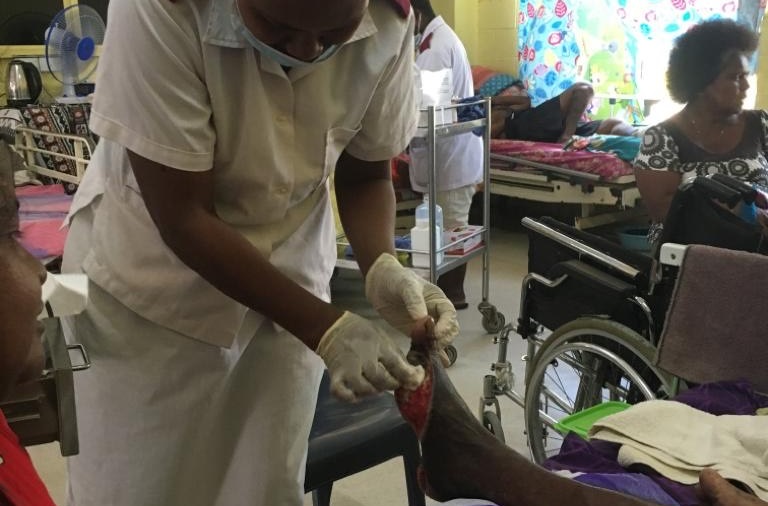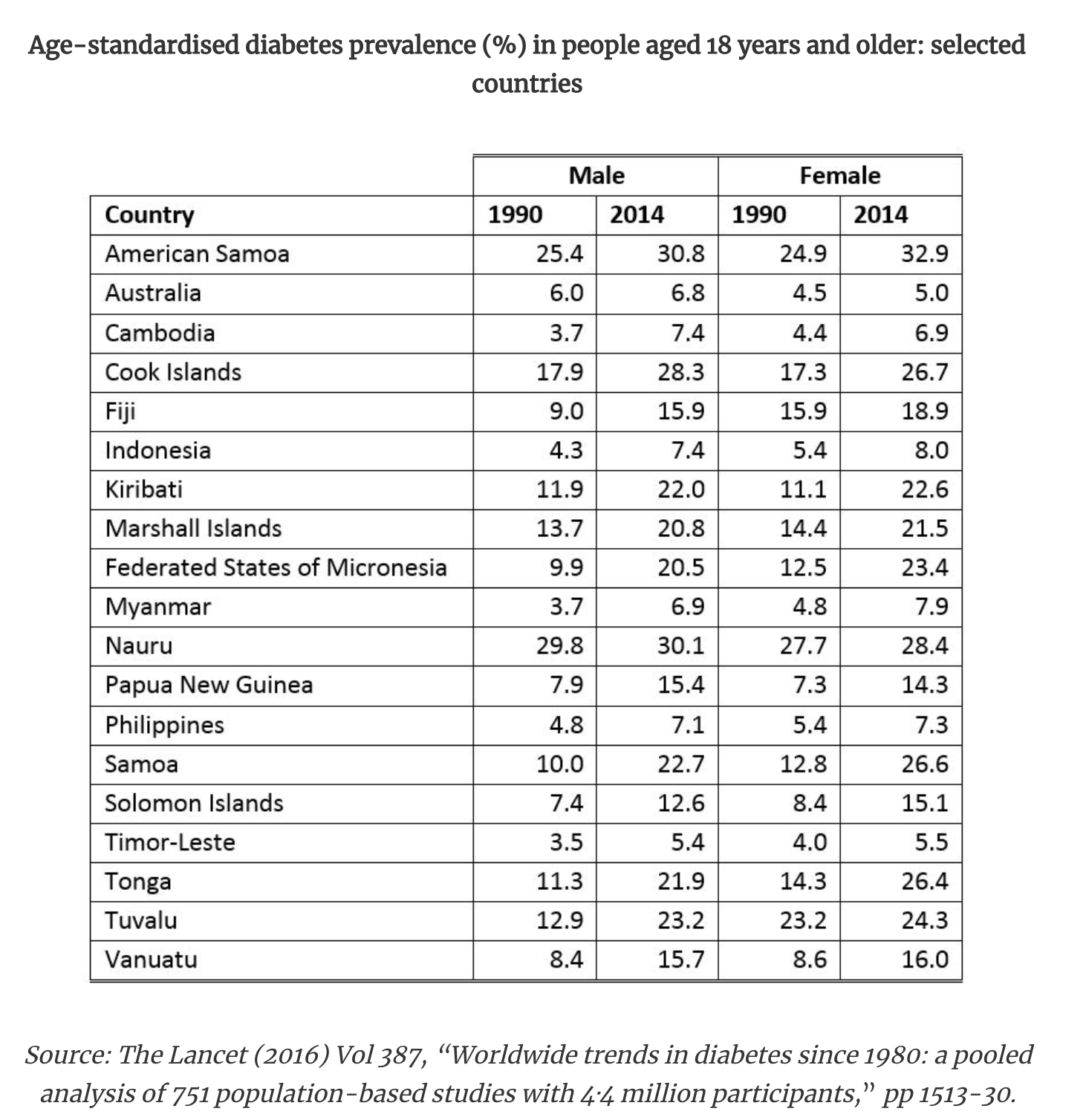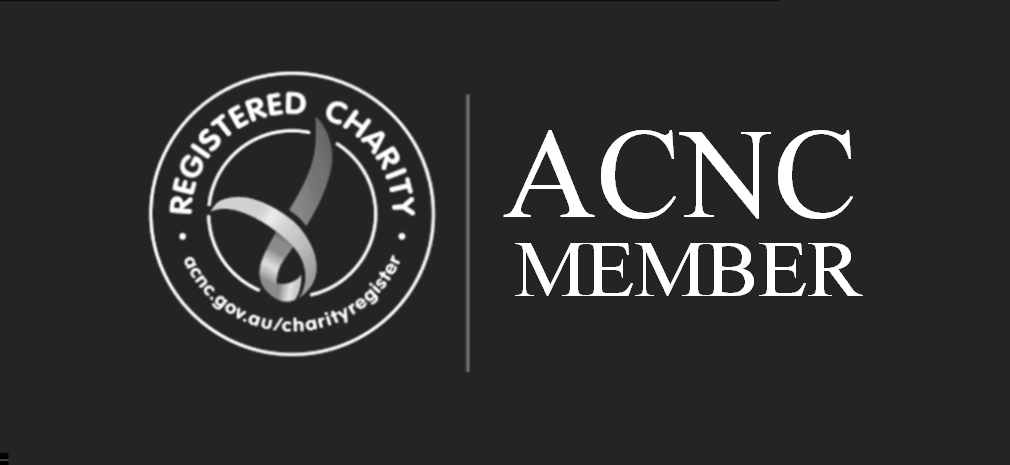
If the news reported that crocodile or shark attacks were to blame for 20 people losing their legs in 1 month alone, there would likely be a call to arms. This problem is actually occurring as we speak, except crocodiles or sharks are not to blame… Its Diabetes.
I was recently invited by DAISI to visit the Solomon Islands on a fact-finding trip to look into and report on the extent of diabetes related foot disease. I have worked across the UK, Middle East and Australia and further consulted across the globe in the area of diabetes foot disease. I have been exposed to varying levels of healthcare and worked in areas with different populations and incidences of diabetes foot disease. However, the extent of this problem in the Solomon Islands is disturbing. Diabetic Foot Disease, including foot ulcers are amongst the most common complications of uncontrolled diabetes. People with diabetes are more susceptible to developing foot ulcers that are slower to heal and more prone to infection. Currently in many Pacific countries, untreated, infected diabetic foot ulcers are leading to multiple amputations and sometimes death. The true extent of foot disease in the pacific islands is largely estimated, because there is no accurate record keeping.
I visited the National Referral Hospital in Honiara and had the opportunity to spend the day with a wonderful general surgeon Dr Rooney Jagilly. Dr Jagilly heads up the general surgery ward, a ward consisting on 50 beds. Alarmingly, such is the extent of the diabetes foot disease that 50% (25 beds) of the ward were solely dedicated to people with diabetes foot disease. Many patients had extensive leg amputations or surgery to remove large sections of the foot, secondary to infection and sepsis. The surgeons, the nurses and all ward staff work effortlessly, but are faced with significant challenges that include a never-ending tide of new people needing beds for diabetic foot disease, the lack of basic health infrastructure and support, and a lack of some basic woundcare necessities. In addition, the problem of managing diabetic foot disease in the out-patient setting paints a similar picture. I also spent the day working in the diabetes-wound clinic. The clinic treats between 30-50 patients with diabetic foot ulcers per day, with minimal resources. In the face of such adversity, I was overwhelmed by the nurses and doctors, that despite the inherent lack of equipment or support, strove to provide the best care they could for each patient, with so little.
What was glaringly obvious to me was that this is a massive problem in need of support. I am not the only person to recognise that diabetes and its complications are a scourge on the pacific islands. In 2015 the International Diabetes Federation reported the astonishing statistic that Pacific island countries or territories accounted for eight of the top ten in the world for diabetes prevalence. About 40% of the Pacific island region’s population of 9.7 million has been diagnosed with a noncommunicable disease, notably cardiovascular disease, diabetes and hypertension. These diseases account for three quarters of all deaths across the Pacific archipelago and 40–60% of total health-care expenditure.
The table below shows the change in diabetes prevalence for selected low- and middle-income countries of interest to Australia, with Australia included as a comparator.

Fig 1. Diabetes prevalence rates in Australia versus South-Pacific Nations.
With a doubling of diabetes in the South Pacific in the last quarter of a century it can only be viewed as an epidemic worthy of serious concern and consideration.
With this in mind DAISI has thought it necessary to begin to address the burden of illness particularly as it relates to inpatient admissions to National Referral Hospital, the major referral hospital in Solomon Island’s Capital Honiara.
Dr Matthew Malone is the current Head of Department for the High-Risk Foot Service at Liverpool Hospital in Sydney and a Senior Research Fellow with the Liverpool Diabetes Collaborative Research Unit at the Ingham Institute of Applied Medical Research Sydney. In December 2019 Dr Malone travelled to National Referral Hospital (NRH), Honiara, Solomon Islands to organise and conduct a two day diabetic foot clinic, as part of a pilot program intended to improved the management of the diabetic foot, and reduce admission and amputation rates.



